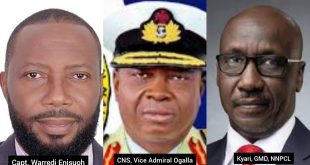Nigeria is regarded as the giant of Africa, albeit in terms of geographical landscape and size of its population, however in the maritime sector several stakeholders have expressed optimism that the country could become the hub of maritime activities in the West and Central African region.
This lofty goal has driven the nation to develop several policies, organize countless stakeholders’ summits, establish numerous Presidential committees, yet the goal seems to elude the nation. Despite Nigeria’s enormous resources in maritime and other natural resources, as well as human capital, the polity has been plagued by mortal enemies such as; corruption, nepotism, tribalism, religious intolerance, inefficiency and several other vices that hide under the phrase, “Nigerian Factor!”
Trade facilitation is a concept that connotes expeditious movement, release and clearance of goods from one country (point of origin) to another (point of destination). According to the Swedish Trade Procedures Council, trade facilitation is a concept directed towards reducing the complexity and cost of trade transaction process and ensuring that all these activities take place in an efficient, transparent and predictable manner. This includes improving logistics at ports and customs.

There is no doubt that the process of importing and exporting goods is cumbersome given the lengthy supply chain involved in transporting the products from the country of origin to the country of destination and eventually to the warehouse of the importer. Prior to the technology-driven age, facilitation of trade was done manually and involved the use of papers but, the process was surprisingly seamless because there were few regulatory agencies involved. The importers were also few and the duties were reasonably fair.
Generally, veterans say the system was efficient as it took 48hours to clear cargoes from Nigerian ports. The major challenge in the past few decades was the delay in transporting shipping documents like bill of lading from one country to another. In most cases, it took several weeks to arrive the destination country causing delay in the release of the shipment which probably arrived earlier.
Despite several efforts by the Nigerian government to correct the appalling trade situation at the ports, trade facilitation preached by all agencies at the ports continues to elude the industry. The Vice President’s Executive Order on Port Operations and Ease of Doing Business Initiatives have been futile. The Nigeria Customs Service (NCS) have been dished a fair share of the blame for the delays in their procedures but what should the nation expect of officers made to painstakingly scrutinize containers without the use of scanners?
At yet another stakeholders’ summit organized by the African Centre for Supply Chain (ACSC) to mark its 7th ACSC Fellowship Investiture and Induction ceremony, several stakeholders brainstormed on this agelong problem of trade facilitation.
Speaking as the lead speaker on the theme;“Trade Facilitation: The Nigerian Challenge”¸ the Chairman, GMC Logistics, Mr. Sonny Allison highlighted the utilization of a Single Window as a possible gamechanger in the nation’s port sector.
He explained the Single Window as a hub that would allow all stakeholders in trade to access information for import or export without going directly through multiple agencies.
“Single Window is a one-stop-shop process that obviates the need for a trader to fill various forms at different agencies. Thus, by completing the details of his/her documentation online, all the relevant agencies can access it. The advantage of this reform cannot be overemphasized because it helps reduce the cost of doing business and the time of administering the trade supply chain” he said.
While he commended the efforts of the NCS in the bid to facilitate trade, Allison stressed that the agency would have to collaborate with other relevant authorities to have a single platform and eliminate the era of bloated bureaucratic processes.
He also stated that the mounting of unapproved roadblocks and harassment of cargo truckers by various law enforcement agents has become an inhibiting factor to trade.
Meanwhile, speaking on the part of the government regulatory agencies, the Deputy Director of Enforcement, Monitoring and Compliance at the Nigerian Shippers’ Council (NSC) Chief Cajetan Agu stressed that the essence of trade facilitation was to improve global efficiency.
Agu decried the lack of competition at the nation’s ports, noting that the operators have been more willing to form associations just to agree on charges.
“The idea is to compete to survive but Nigerian ports aren’t competitive. When you look at the key pillars of trade facilitation, one of them is transparency but this is absent at Nigerian ports. For example, if I’m bringing in a container of a particular consignment, I should know the amount I would be spending for duty, cost of the shipping company and terminal operator’s services. These figures should be known; I should be able to predict. I should be able to have an idea of the entire cost of clearing the consignment and know my profit”, he said.
Agu also stressed the need to have simplified uniform processes for documentation at the ports, lamenting that several years after the need for a Single Window platform had been highlighted; the nation wasn’t any closer to developing one.
He also recalled the initial efforts of the NSC when it became the port economic regulator.
“The first thing Shippers’ Council did with the port regulatory mandate was to confirm if the operating terminals had the requisite facilities and equipments to operate. There are certain level of equipments these concessionaires ought to have as stipulated in the concession agreement. The second study was on port access roads in Lagos in order to identify what was responsible for the gridlock. The problem isn’t just the bad roads. Although the bad roads contribute to the problem, the consultant that carried out the study came up with what he called the Lagos port logistics ring. The ring goes round Apapa, Ijora, Orile, Mile 2, Tin Can and back to Apapa. Within that ring there are two international seaports, 27 tankfarms as at the time the study was carried out as well as other logistics facilities. The study revealed that on a daily basis, within this ring there are between 5,000 to 7,000 trucks and tankers but the capacity of all the logistics facilities including the two seaports isn’t up to 2,500 on a daily basis. What are the excess of 2,500 to 4,000 trucks and tankers doing on the roads? This is where the problem started. People don’t have businesses at the ports, yet they take their trucks and tankers to the ports in search of businesses” he said.
According to Agu, in more organized countries only trucks and tankers that have cause to be at the ports are allowed into such crucial logistics ring. He stressed that the consultant’s call for the establishment of an electronic truck call-up system would resolve the Lagos port traffic menace.
He also highlighted technology as a viable tool in the nation’s bid to facilitate trade and urged the various port operators to be open to receive and deploy innovation in various aspects of their port activities.
Meanwhile, the Director General of ACSC, Dr. Obiora Madu stressed that the nation needed a massive cultural behavioural change, noting that the human element and tough economic times have forced many officers at the port regulatory agencies to jettison trade facilitation for financial gratification.
“When you look at the map of the world, you would realize that geographically everything seems to favour Nigeria including the time (GMT+1). Nigeria is in the center of the world and blessed with enormous natural resources and human capital. What went wrong?” he wondered.
Dr. Obiora lamented that the nation’s port system had been crippled by arbitrary levies, saying; “There is a particular levy that is $17,000 at the Nigerian airport but it is $2,000 at the Ghanian airport. These are facts that could be investigated and these charges are the major inhibiting factors. This explains why foreign aircrafts drop cargo in Nigeria and fly to Ghana airport to pick up goods to take back”
Is there ease of doing business or trade facilitation when port operators can’t access the ports? How does one facilitate trade without power supply? What are the implications of the numerous government policies and executive orders that were premised on trade facilitation and ease of doing business?
Beyond developing several terms to explain policies that would connote trade facilitation, it is high time the Nigerian government prioritizes real trade facilitation actions and mobilizes technical assistance and capacity building for all stakeholders.
The nation is in dire need of significant investment for a functional logistics and port sector. The era of physical examination should be dispensed and functional scanners must be acquired for ease and expeditious cargo examination.
 MMS PLUS NG – Maritime, Aviation, Business, Oil and Gas News Online Newspaper with coverage in Maritime, Oil and Gas, Aviation, Power and Energy as well as Financial News
MMS PLUS NG – Maritime, Aviation, Business, Oil and Gas News Online Newspaper with coverage in Maritime, Oil and Gas, Aviation, Power and Energy as well as Financial News










